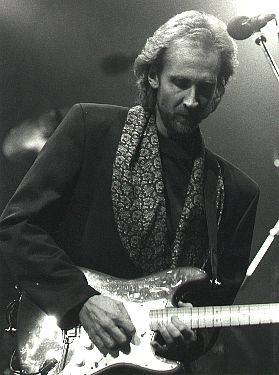TWR: I think on this album people could actually see where the musicians were coming from, whereas on a track like "Follow You Follow Me" which is a great little track, you canít really see the musicianship whereas on a track like "Driving The Last Spike", it's there for all to see...
MR: I have always felt that some of Genesis' strongest points have been the album tracks actually - where there is more of a mood that is "Genesis".
TWR: Many fans have discussed that on "We Can't Dance" they can't detect where the songs began - "Oh that one's Tony's" and so on. Which of the songs on the album did you instigate?
MR: It's not as clear cut as that, although the obvious one is "I Can't Dance" which was my guitar riff and Tony's keyboard part and is what I like.
On "No Son Of Mine" that, to me, was a great little song because it just happened and we just wrote it by deciding we'll try it out for the album and it will be great; or if it doesn't work we'll throw it away. And Phil had lyrics and it just happened in the morning, and then Tony had the elephant noise and I tried to get two or three chords under it and the atmosphere was just great. "Dreaming While You Sleep" started with just the drum machine; that's why its working title was "Rolling Toms". A lot of the songs just began around the drum machine and then we would get the chords.
TWR: The trend on the last two or three albums has been towards telling a story that not only the listener can relate to directly, but also through the injection of more social observation into the lyrics. Is that how you as a band member feel about the extra element of realism in the songs you are writing now?
MR: It is probably Phil's influence. I tend to shy away from that. I donít want to be seen as preaching to people and I shy away from being that direct and say it in a way which is more indirect. When Phil writes lyrics he never sounds pompous.

Mike on stage in 1992
(Photo - B. Cutler/TWR)